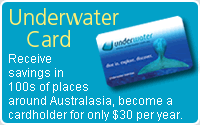- Home
- Directory
- Shop
- Underwater Cameras - Photographic Accessories
- Smartphone Housings
- Sea Scooters
- Hookah Dive Systems
- Underwater Metal Detectors
- Dive Gear
- Dive Accessories
- Diving DVD & Blu-Ray Discs
- Diving Books
- Underwater Drones
- Drones
- Subscriptions - Magazines
- Protective Cases
- Corrective Lenses
- Dive Wear
- Underwater Membership
- Assistive Technology - NDIS
- On Sale
- Underwater Gift Cards
- Underwater Art
- Power Stations
- Underwater Bargain Bin
- Brands
- 10bar
- AOI
- AquaTech
- AxisGo
- Backscatter Underwater Video and Photo
- BLU3
- Cayago
- Chasing
- Cinebags
- Digipower
- DJI
- Dyron
- Edge Smart Drive
- Eneloop
- Energizer
- Exotech Innovations
- Fantasea
- Fotocore
- Garmin
- Geneinno
- GoPro
- Hagul
- Hydro Sapiens
- Hydrotac
- Ikelite
- Indigo Industries
- Inon
- Insta360
- Intova
- Isotta Housings
- Jobe
- JOBY
- Kraken Sports
- LEFEET
- Mirage Dive
- Nautica Seascooters
- Nautilus Lifeline
- NautiSmart
- Nitecore
- Nokta Makro
- Oceanic
- Olympus
- OM System
- Orca Torch
- Paralenz
- PowerDive
- QYSEA
- Scubajet
- Scubalamp
- Sea & Sea
- SeaDoo Seascooter
- SeaLife
- Seavu
- Shark Shield
- Sherwood Scuba
- Spare Air
- StickTite
- Sublue
- Suunto
- SwellPro
- T-HOUSING
- Tusa
- U.N Photographics
- Venture Heat
- XTAR
- Yamaha Seascooter
- Youcan Robot
Darwin City

Darwin, a modern tropical capital set on a harbour twice the size of Sydney's, is Australia's most successful multicultural city. More than 50 nationalities are among the Darwin region's population of around 105,000, including the Larrakia Aboriginal people. The city is closer to Jakarta than it is to Canberra - no wonder it is referred to as the Gateway to Asia.
As the capital of the Northern Territory and one of the major centres in northern Australia, Darwin is well served in terms of communications, transportation, technology and other facilities and resources. Originally named Palmerston, Darwin has come a long way since it was a tiny outpost that existed only to serve South Australia's desire for a settlement in the north. The establishment of an Outback Telegraph Station in the 1870s, followed by a minor gold rush which attracted thousands of Chinese (outnumbering the European population at the time), further entrenched the settlement - but it is the disasters that have really shaped Darwin's character.
The people of Darwin enjoy a laid-back lifestyle, aided by the warm tropical climate. Darwin is green and lush with palms and the perfume of frangipanis, and is clean (a survey by Personal Investment Magazine found Darwin has the nation's cleanest air and best water).
And then there's that beautiful harbour, just a street or two away from the city centre. Darwin's glorious waterfront can be enjoyed by taking a harbour cruise or chartered fishing trip, or a flight in a sea plane or helicopter. View it from dry land at the bustling Wharf Precinct (with restaurants, cafes, museum displays and galleries); Bicentennial Park on the Esplanade; the boardwalk at Cullen Bay or the clifftop at East Point.
In the Directory
Photos

- Fishing - Stokes Hill Wharf - Photo courtesy of Northern Territory Tourist Commission

- Cullen Bay - Photo courtesy of Northern Territory Tourist Commission

- Aerial of Darwin - Photo courtesy of Northern Territory Tourist Commission
Underwater Recommendations
Check out the wrecks scattered in the Darwin harbour, remains of a Japanese air raid in 1942, and find an abundance of reef fish darting around munitions, trucks, rifles and a Harley Davidson!
The diving here can be challenging, as there are strong tidal currents and the visibility, especially in Darwin Harbour, can be very low.
Take a trip out to the Fenton Patches Artificial Reef, approximately 30 km north of Darwin. Scattered through the area are reefs formed by tires, confiscated Chinese fishing vessels, bus stop shelters, barges, concrete pipes and Vietnamese refugee boats now harbouring tropical reef fish and schools of Jewfish.
Getting There
Darwin is located at the top end of Australia, a bit more than 1500 km north of Alice Springs. You can, of course, drive yourself or catch a train or bus. There is also an international airport at Darwin.
In the Directory

Shopfront
-
 Who Lives in the Sea? - DVD for kids
Who Lives in the Sea? - DVD for kids
- Who Lives In The Sea entertains and educates children and their parents about a variety of marine animals living in the ocean. What kind of noise does a sea lion make?
- $AU 24.95
- 5% Cardholder's Discount!









